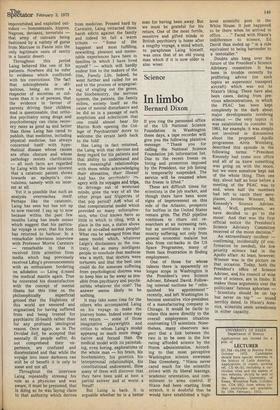Science
In limbo
Bernard Dixon
If you ring the personnel office of the US National Science Foundation in Washington these days, a tape recorder will give you the following plaintive message: "Thank you for calling the National Science Foundation job information list. Due to the recent freeze on hiring and promotion imposed by the President, our job listing is temporarily suspended. The service will be resumed when the freeze is lifted."
These are difficult times for scientists in the job market, and though there have been some signs of improvement on this side of the Atlantic, prospects for boffins in the United States remain grim. The PhD pipeline continues to churn out researchers at an increasing rate, but as novitiates into a community suffering not only from general economic malaise but also from cut-backs in the US Space Programme, many of them face frustration in finding employment.
One of those for whose talents there is apparently no longer scope in Washington is the President's own Science Adviser, Edward David. Following internal ructions he "relinquished his appointment" recently, and left Washington to become executive vice-president of a manufacturing company in Chicago. It would be facile to relate this move directly to the overall employment situation confronting US scientists. None theless, many observers suspect that a link between thc two is to be seen in the low rating afforded science by the Nixon administration. Accord ing to that most perceptive Washington science newsman Dan Greenberg, "Nixon never cared much for the scientific crowd with its liberal leanings, academic orientation, and commitment to arms control. If Nixon had been starting from scratch, it is doubtful that he would have established a high level scientific post in the White House. It just happened to be there when he arrived in office. . . ." Faced with Nixon's indifference to science, Ed David thus ended up "in a role equivalent to being bartender to a teetotaller."
Doubts also hang over the future of the President's Science Advisory committee. It has been in trouble recently by proffering advice (on such topics as supersonic transport aircraft) which was not to Nixon's liking. There have also been cases, dating from pre vious administrations, in which the PSAC has been kept completely in the dark about major developments involving science — the very topics it was established to consider. In 1961, for example, it was simply not involved in discussions about the proposed Apollo programme. Alvin Weinberg, described this episode in the following terms: "President Kennedy had come into office and all of us knew something was going on with the moon, but we were somehow kept out of the whole thing. Then one day, about half an hour before a meeting of the PSAC was to end, when half the members had left to catch their aeroplanes, Jerome Wiesner, Mr Kennedy's Science Adviser, said, 'Well, gentlemen, we have decided to go to the moon'. And that was the first official notice the President's Science Advisory Committee received of the moon decision."
An extraordinary incident — confirming, incidentally (if confirmation be needed), the low priority science had in the Apollo affair. At least, however, Wiesner was in the picture on that occasion. Today, both the President's office of Science Adviser, and his council of wise men of science, are in limbo. It makes those arguments over the politicians' famous aphorism — "Scientists should be on tap but never on top" — sound terribly dated. In Nixon's America, scientists seem unwelcome in either capacity.


































 Previous page
Previous page